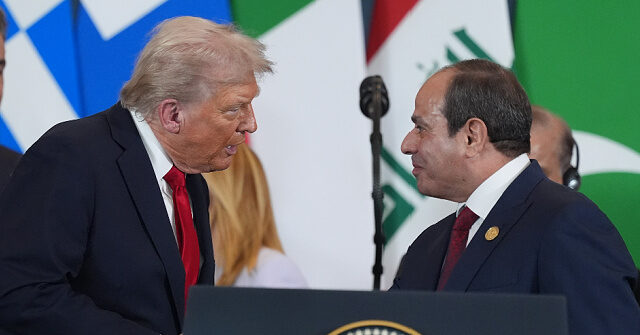Egypt’s President Abdel Fattah el-Sisi has proven to be a key partner in President Donald Trump’s peace plan for Gaza, helping with the negotiations and hosting a triumphant Gaza peace conference in the city of Sharm el-Sheikh on Monday.
It was a remarkable turnaround in relations between the U.S. and Egypt, a longtime U.S. ally that Trump’s predecessors, Joe Biden and Barack Obama, worked hard to alienate.
Trump and Sisi applauded each other’s role in the peace process on Monday. Sisi said he was certain Trump was “the only one capable of bringing peace to our region.”
Trump responded by praising Sisi as a “powerful leader” and a personal friend. He said Sisi “played a very important role” in the Gaza peace process.
Trump also praised Sisi for taking a strong hand against crime in Egypt.
“They have very little crime because they don’t play games. That’s why. Like we do in the United States with governors that have no idea what they’re doing,” Trump said, needling Democrat governors who have been interfering with federal law enforcement efforts to protect criminal illegal aliens.
Trump’s comments enraged left-wingers who have never forgiven Sisi for overthrowing the Islamist regime that took power in Egypt after the “Arab Spring” uprisings of 2011. The Obama administration wholeheartedly supported those putative uprisings against authoritarianism, even after it became clear the Arab Spring was more about the blossoming of Islamist domination than a flowering of democracy.
Such was the case in Egypt, where strongman Hosni Mubarak was toppled and replaced by the sinister Muslim Brotherhood, a violent Islamic supremacist organization. The only democratically elected leader of Egypt to date, Mohamed Morsi of the Muslim Brotherhood, took office in 2012.
Morsi was, in turn, overthrown by Gen. Abdel Fattah el-Sisi in July 2013. Sisi has been president of Egypt ever since. It should be noted that Morsi was no fan of democracy – his government was authoritarian, power-hungry, and hostile toward dissent by any rational measure. Sisi has also maintained power through oppressive policies, including the use of deadly force against Muslim Brotherhood protests after he overthrew Morsi.
The Obama administration clearly favored Morsi, indulging him with foreign aid despite rules that ostensibly set human rights standards Morsi could not meet, and demanding his release from prison after Sisi overthrew him.
Looking back on Obama’s Middle East policy in 2018, the Jerusalem Post recalled how Obama and his Secretary of State Hillary Clinton were enchanted by the fantasy of the “moderate Islamist,” as supposedly represented by the Brotherhood and Iran’s “reformist” president at the time, Hassan Rouhani.
Obama ignored the rising tide of human rights violations under Rouhani in his eagerness to cut deals with the Iranians and realign America’s Middle East policy away from the Gulf states, and he likewise ignored the Muslim Brotherhood’s support of jihad by proxy to treat their rise in Egypt as a triumph of democracy.
The Jerusalem Post noted this was no coincidence, as Morsi was “friendly to Iran” and had been accused of leaking Egyptian state secrets to Iran’s Islamic Revolutionary Guard Corps (IRGC). Obama seemed keen on getting Egypt and Iran into the same orbit — and he was apparently furious when Sisi disrupted those plans.
Sisi won little applause from the Obama administration when he made benevolent gestures, such as offering to rebuild all the Christian churches destroyed by the Muslim Brotherhood after Morsi was overthrown.
Obama suspended U.S. military aid to Egypt after Morsi was overthrown, but eventually relented and restored funding in March 2015, to the dismay of some leftists who thought he was tacitly accepting Sisi’s coup and giving up on the “promise” of the Arab Spring.
There was not much “promise” left by that point, and Sisi was proving to be a devoted enemy of the Islamic State, which Obama notoriously failed to confront effectively. Obama was reduced to babbling about “degrading and ultimately destroying” ISIS over a span of decades, while Sisi was putting together military coalitions and fighting back after ISIS attacks on the Sinai Peninsula. Obama needed all the help he could get.
President Donald Trump smashed ISIS in 2019, decades ahead of Obama’s “degrade and ultimately destroy” timetable. He publicly embraced Sisi during his first term, in part, because he saw Sisi as a useful partner in counterterrorism and an “anchor of stability in the Middle East,” as the Trump White House put it.
In September 2019, Trump found himself waiting for Sisi to appear for a meeting at the G7 summit in France. Trump loudly called out, “Where’s my favorite dictator?” When Sisi arrived for the meeting, Trump praised him as a “very tough man” and a “good man” who has “done a fantastic job for Egypt.” If the “favorite dictator” quip caused Sisi any discomfort, he and his office gave no sign of it.
Biden campaigned in 2020 by harshly criticizing Trump for being close to Sisi, promising “no more blank checks for Trump’s favorite dictator.”
When Biden took over in 2021, he was less openly hostile toward Sisi than Obama, but his administration was still clearly uncomfortable with the Egyptian president. By 2022, Biden was in no position to alienate a longstanding U.S. ally or trash America’s economic relationship with Egypt, but he continued hectoring Sisi on human rights, and he never saw a way he could use Egypt as a force for stability or positive change, the way Trump did when he returned to office in 2025.
Biden did not completely shut down aid to Egypt as Obama did, but he withheld some $300 million of Cairo’s military aid over human rights concerns. Biden abruptly ended that practice in September 2024 because he wanted Egypt’s help with containing the Gaza war.
The people who ran the Biden administration seemed perpetually surprised that leaders like Sisi have long memories for insults, especially the kind of insults that threaten their governments by evoking the specter of regime change. Biden’s handlers, and his would-be successor Kamala Harris, could not have assembled a coalition like Trump did in Gaza, and they never would have looked past their personal disdain for Sisi to see how important he could be to the Gaza peace process.
The post How Obama and Biden Alienated Egypt’s Sisi, a Core Ally in Trump’s Peace Deal appeared first on Breitbart.




